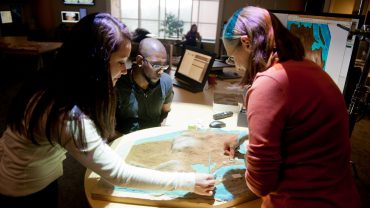Geospatial Information Science and Technology
The Master of Geospatial Information Science and Technology (MGIST) program equips students with the necessary knowledge and tools to become high-end geospatial professionals using a unique curriculum that leverages NC State’s strengths in computational sciences, geographic information systems (GIS) and natural resources in combination with professional skills development in areas such as project management, group dynamics, and communication.
The MGIST can be completed entirely online, allowing flexibility for both students just entering the workforce and working professionals. The program also admits a small number of on-campus students each year. The schedule, structure, expectations, and rigor of the program are identical, whether you are on-campus or in the online program.
Through a combination of geospatial theory, hands-on applications, and client-based instruction, students graduate from the program with a solid foundation to provide a wide range of geospatial expertise for local, state, national, and international organizations.
Students in the MGIST program also receive the Professional Science Master’s designation on their transcript upon graduation. The PSM program is a nationally recognized program focusing on preparing professionals with both the technical and professional skills necessary to succeed in the workplace. The NC State PSM Program and the National PSM Organization provide valuable resources for students in PSM degree programs, including mentoring, professional development workshops, and other resources.
Eligibility
Admissions to the MGIST is based on an applicant’s undergraduate and post-graduate educational background and professional experience. At a minimum, applicants must meet the following criteria:
-
- Completion of an undergraduate degree and an undergraduate GPA of 3.0 or higher. We accept students from a variety of undergraduate degrees, if you are unsure if yours qualifies, please contact us.
- Preferred Skills in the areas of:
- Basic Geographic Information Systems
- Introductory programming (in any language, but Python is taught in our program)
- Introductory statistics
Generally an undergraduate course or 1 to 2 years of using these skills in the workplace are sufficient. For applicants concerned about not having 1 or more of these skills in place at the time of admission, the program may recommend one or more courses to be completed during the first semester of enrollment (or students may consider taking courses as a non-degree student prior to admissions to gain these skills). Please address these skills in your personal statement.
Professional experience is not required, but many of our students have had some experience in GIST outside the classroom. This can be highlighted in your resume/CV and personal statement uploaded as part of your application.
A full application consists of:
- Graduate School Application (indicate 'Distance Track' for the online program)
- Official transcripts from colleges and universities attended
- A resume/CV
- Personal Statement
- Three Letters of Recommendation
Plan of Study
The MGIST curriculum consists of at least 33 credit hours, 21 of which are required core courses. The additional 12 credit hours are electives and allow the student to focus on related areas of interest to supplement their GIS instruction and professional skills development. As part of the program students will complete a Capstone project and develop a Professional Portfolio.
Students are required to take at least one course per semester (Fall and Spring) for the duration of the program (unless financial aid or other considerations require half-time (4.5 hours) or full-time (9 hours) status). Students must have a cumulative GPA of 3.0 or greater in order to graduate. It typically takes a minimum of 4 semesters (2 academic years) to complete the appropriate sequence of courses. Students have a maximum of 6 years to complete the program.
Courses cover theory, application, and back-end development relevant for today's geospatial professionals using both open source and ESRI tools.
Capstone Experience
An integral part of the Master of Geospatial Information Science and Technology program is participation in a Capstone project during the last semester of the program. Students work directly with community and industry partners to apply the knowledge and skills they have developed in the program to real-world problems. The program works closely with each student to identify an appropriate project based on our partner’s needs and the interests of the individual students. Students present their final project to their peers and the greater geospatial community during our Digital Symposium.
Professional Portfolio
All students are also required to produce a professional digital portfolio. The digital portfolio will present personal MGIST program accomplishments to demonstrate individual competencies through knowledge, skills, and abilities of a geospatial science professional.
Residential Component
A unique aspect of our online Master of Geospatial Information Science and Technology program is an emphasis on building relationships between our online students, faculty, and on-campus students. We feel this is an extremely important component of graduate education. It is important that our program provide a sense of community among our students, even those that may be studying in a different state or country. To facilitate this interaction, our program requires that students come to campus on two occasions during the program.
The first is an all-day orientation program at the start of the program designed to introduce faculty and advisors, bridge relationships between our new online and on-campus students, learn about the details of the program, and have fun together!
The second on-campus experience takes place at the end of the program during our Digital Symposium. Students graduating will be asked to participate in a symposium to present their Capstone projects to our community partners, and the geospatial community at NC State. It is a great networking and professional development opportunity for graduating students.
Career Prospects
The job market for individuals with GIS development and analytic skills is excellent and growing. For example the National Geospatial Intelligence Agency alone will require 7,000 analysts per year for the foreseeable future. The U.S. Department of Labor currently identifies the Geospatial Technology sector as one of 14 high growth industries in dire need of new professionals and targeted with special funding to develop this workforce.

